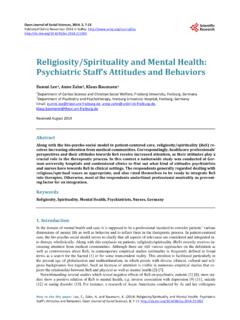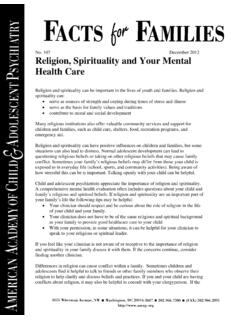Transcription of What Is the Role of Spirituality in Mental Health Treatment? D
1 Does religion and/or spiri- tuality have a role in modern Mental Health treatment ? For most of the 20th century, psychiatry has had a somewhat negative view of Spirituality , partly because of Freud s antireligious bias and the subsequent focus of Ameri-can psychiatry on the biological aspects of Mental illness (Pe-teet, 2007b). However, in the past few decades, Spirituality has gained increasing recognition as an important aspect of medical and psychiatric may surprise some that the first established psychiatric care in the United States was originally related to spiritual-ity. Little known today, moral treatment (widely practiced from circa 1815 to 1875) was a system originating in Europe involving compassionate psychological and spiritual treatment based on the idea that insanity was a dis-ruption of both mind and spirit (Taubes, 1998).
2 Spiritual care was very much a part of the care patients received in those days. Religious services were held on the grounds, and patients were encouraged to attend. During the next several decades, how-ever, attitudes toward religion became progressively negative. From 1908 until his death in 1939, Freud wrote vigorously against religion, and his teach-ings dramatically changed the views of the following genera-tion of psychiatrists. Things are happening now to reverse this trend, the most excit-ing of which is a huge volume of research demonstrating the value of Spirituality for both medical and psychiatric patients.
3 More than 60 studies have examined the role of religion in helping peo-ple cope with a number of diverse conditions, including diseases of the heart, lung, and kidney, as well as diabetes, AIDS, cancer, amyotrophic lateral sclerosis, ar-thritis, chronic pain, and other conditions (Koenig, 2002). A summary of research on physical Health outcomes (Koe-nig, McCullough, & Larson, 2001) showed positive effects of religion/ Spirituality on physical Health in a number of investi-gations: Religious beliefs and activities were associated with better immune functioning in 5 of 5 studies; lower death rates from cancer in 5 of 7 studies; less heart disease and better car-diac outcomes in 7 of 11 studies; lower blood pressure in 14 of 23 studies; lower cholesterol in 3 of 3 studies; less cigarette smoking in 23 of 25 studies; more exercise in 3 of 5 studies.
4 And better sleep in 2 of 2 studies. More than 700 studies have examined the relationship among religion, well-being, and Mental Health , with nearly 500 of them demonstrating a significant posi-tive association between religion and better Mental Health , greater well-being, and lower substance abuse (Koenig et al., 2001). Af-ter extensive review of the re-search on Spirituality and Mental Health , Koenig et al. (2001) con-cluded that:In the majority of studies, re-ligious involvement is correlated with well-being, happiness, and life satisfaction; hope and opti-mism; purpose and meaning in life; higher self esteem; adapta-tion to bereavement; greater so-cial support and less loneliness; lower rates of depression and fast-er recovery from depression; low-er rates of suicide and fewer posi-tive attitudes toward suicide; less anxiety; less psychosis and fewer psychotic tendencies; lower rates of alcohol and drug use or abuse; less delinquency and criminal ac-tivity; and greater marital stabil-ity and satisfaction.
5 (p. 228)In addition to a significant area of research, Spirituality is be-coming part of modern medical and psychiatric practice. Many patients with diseases turn to religion for comfort, and spiri- tuality becomes increasingly im-portant as patients face serious illness. Growing evidence sug-gests that religious beliefs influ-ence patients medical decisions (Koenig, 2004). Many patients consider spiritual Health equal in importance to physical Health and desire their physicians to What Is the Role of Spirituality in Mental Health treatment ? Guest Editorial 2009 iStock International Inc. Guest Editorialconsider their spiritual needs (King & Bushwick, 1994).
6 The Joint Commission (2008) now requires that certain patients in inpatient behavioral Health care programs have an assessment that includes the client s religion and spiritual orientation (p. 215). Spirituality is an integral component of palliative medi-cine and Alcoholics Anony-mous, which views the Twelve Steps as a spiritual approach. Within psychiatry, object rela-tions psychoanalysts such as William Meissner and Ana-Maria Rizzuto have revised Freud s interpretation of the dy-namic significance of religious faith. Authors such as Richard Bergin and Allan Richards have published books with the Amer-ican Psychological Association on various kinds of spiritually oriented psychotherapy, includ-ing mindfulness.
7 Educational programs addressing Spirituality have become common in medi-cal schools and residency train-ing programs (Peteet, 2007b).The potential benefit of spiri- tuality as an adjunct in the treat-ment of Mental illness would seem to be obvious. However, when and how to include spiri- tuality may be complex, and a detailed discussion is beyond the scope of this editorial. Like other treatment methods, there are times when inclusion of spiri- tuality should be considered and times it should not. Religion is a deeply personal area of patients lives, and clinicians should nev-er, even indirectly, pressure or coerce patient behavior in this arena.
8 Any conflict with the reli-gious beliefs of the patient should be stringently spiritual needs are identi-fied, then a decision must be made about whether the clini-cian should try to meet those needs and is capable of doing so, or whether referral is neces-sary. In many cases, it may be unwise to delve into spiritual matters unless the clinician has a long-term relationship with the patient (Koenig, 2007). Cer-tain activities, such as clinicians praying with or for patients, may be particularly sensitive (Dagi, 1995). But when appropriate, cli-nicians may consider supporting and even encouraging healthy religious beliefs and activities that are helpful to the patient.
9 It is important to note that for all but the most simple of spiritual needs, trained professionals such as chaplains and pastoral coun-selors should also be involved (Koenig, 2007). Spirituality unquestionably has a place in the treatment of Mental illness for patients who desire it and for whom it is appro-priate. The religious community is an invaluable resource with which Mental Health clinicians should consider linking to more fully address the needs of patients and families. The role of spiritu-ality in Mental Health is a rapidly developing area with great po-tential that will be realized as ad-ditional experience and research is accrued in the area.
10 Readers interested in learn-ing more about this fascinating topic may find a wealth of basic information in Koenig s (2007) Spirituality in Patient Care: Why, How, When, and What. This short, easy-to-read textbook in-troduces readers to the various aspects of Spirituality in medi-cine, including Mental Health , and lays the groundwork for more advanced study. Also par-ticularly helpful is a synopsis of 27 important articles on spiritu-ality and Mental Health recently compiled in the Southern Medi-cal Journal (Peteet, 2007a). REFERENCESDagi, (1995). Prayer, piety, and pro-fessional propriety: Limits on reli-gious expression in hospitals.









